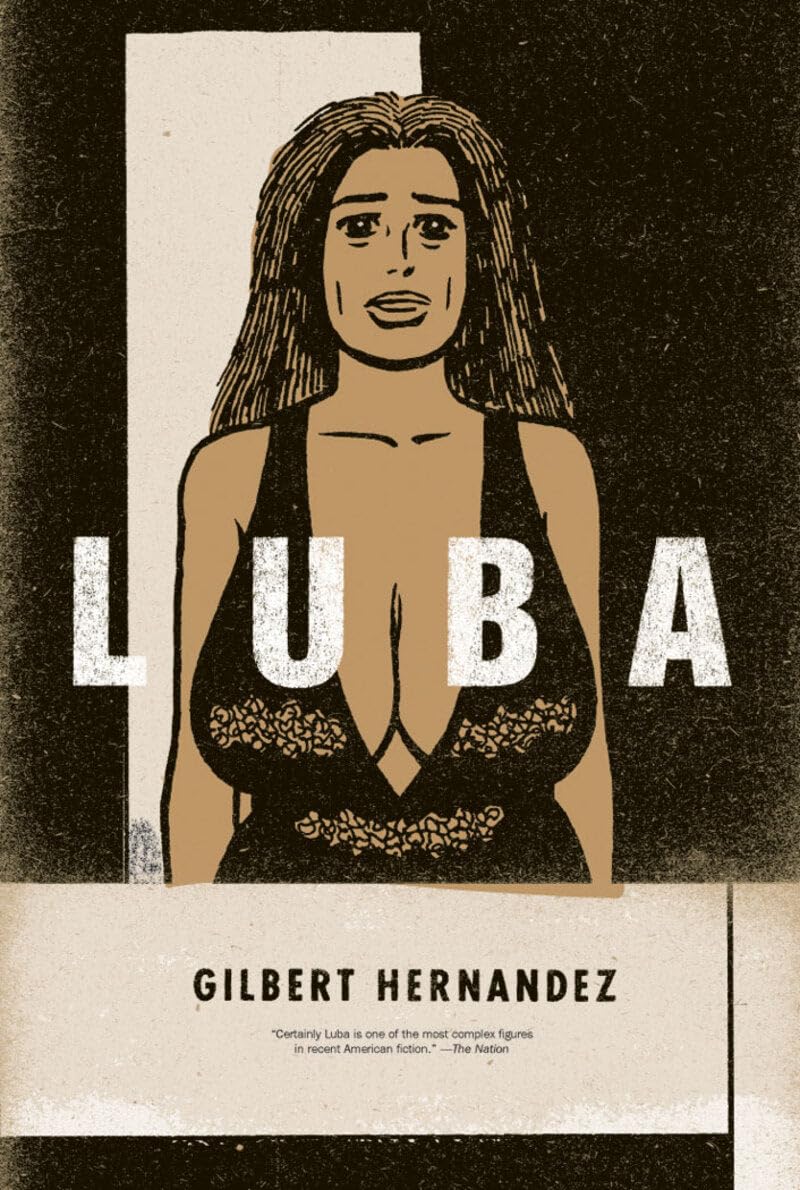

Fantagraphics Books Luba
I**R
Fantastic!
When I was in my 20s, I liked Jamie Hernandez' work much more than Gilbert's, but now that I'm 40, I find that I love Gilbert's just as much if not more. This collection of stories about Fritz and Petra, Venus and Hector (not so much of Luba, although she's in there) are strange, sexy, mysterious, exciting, intellectually engaging, and emotionally moving. I have Jamie's two big Locas hardbacks, which I treasure (especially the first one), but I will put Luba on my bookshelf as one of my favorites. This is my favorite of all of Gilbert's work so far. I like it better than the early Palomar stories and also better than the more recent stuff in the New Love and Rockets (the weird movie vampire stuff is getting on my nerves). Finally, collecting this story in one big book like this allows a real immersion in the stories that does not happen as one reads the stuff little by little over the years. I only wish there was Luba (or Fritz) part II, about 500 pages.
K**A
A little more twisted than the Palomar stories...
Whilst Gilberto is arguably the best writer of the two Los Bros Hernandez, he generally seems to draw the short straw compared to younger brother Jaime's clean lines and tales of lesbian punks growning up in contemporary Los Angeles, which seem to be more accessible to the comic book reading populace than 'Beto's tales of life in a tiny Latin American village. Locas Tambien was always super cool, whereas the Palomar stories was somewhat aloof and unhip, not necessarily meaning bad, but more literary, more grown-up, more serious, probably not values you would associate with comic books. One can't but help wonder if the paradigm shift of the Luba/Palomar world is influenced by this fact, as this volume finds part of the Palomar cast uprooted and transported into contemporary L.A. with plenty of lesbianism and a little punk thrown in.Jaime's Locas stories found a smooth progression from Locas to Locas II, the youthful energy of the characters (an urban American take on the magic realism of Gabriel Garcia Marquez that so deeply influences Beto) being replaced by a kitchen sink realism that almost seemed cruel as the magic of life slowly becomes replaced by the drudgery of real life. With the transition from Palomar to Luba there is no progression, its jarring and shocking as the story jumps forward several years. The easy going life of small town Latin America is replaced by the big city world where life is hard work and/or chasing success: Luba runs an immigration business with her cousin which seems to grind them both down, conversely Pipo runs a sportswear business which is so successful it allows her to branch out into running a television channel.Pipo, arguably Palomar's prettiest girl finds success not just in business but in the bedroom, with her determination to succeed driven by the one rule that she is not going to learn any English, even with a boyfriend who speaks no Spanish. Luba on the other hand seems clumsy, aloof and third world, her giant breasts being the ultimate seduction tool back in Palomar but in LA seemingly useless with her lack of make up and her crass revealing dresses (plus the hammer she always carries around strikes you as being a little weird). On the other hand we also contrast Luba with her glamourous American sisters, successful, confident and lusted after by most of the male characters and quite a lot of the female characters too. Then we have a series of complicated and interlinked love (and sex) triangles which contrast against the innocent (heterosexual) love triangles of the old Palomar stories. The glamour, success and sex do not lead to happiness and often the most glamourous and successful seem to have the most turbulent emotions and be unhappiest.I guess that is the really big difference between the two story arcs, in Luba there is much going on beneath the surface, characters are trapped by their own emotions, their own circumstances and their own search for gratification. Only Luba's niece Venus seems genuinely happy at the end who has been spared the trials of adulthood throughout the book, and her mother Petra who has abandoned her bodybuilding and sisterly competitiveness to become an obese and simple but happy wife, no longer chasing wealth, casual sex and glamour.I felt Palomar held together better as an ongoing narrative than Luba. However, that is not to say that Luba doesn't hold your attention and draw you in, merely that time works in a different way and engages you in a different manner, its piecemeal stories interlinking and interweaving in a somewhat non-linear manner. Its still a work that is way out there beyond anything else in the comic book world and cannot be recommended highly enough.
M**H
five stars plus ... plus a question for Hernandez fans
Got this last week and what a great read with gorgeous line art from Mr GH. Very hard to put it down as you just want to read another short story to see what happens next. This & the other huge book that is this books predecessor are both essential reading.Question: There's a big jump years wise between Palomar and Luba. Is this because Gilbert did other projects during that time or is there a another book inbetween these two that I'm not aware of?Rob
Trustpilot
1 week ago
2 months ago